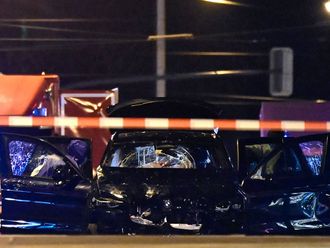Moscow: Russia signalled on Friday it was scrapping the controversial sale of S-300 missiles to Iran in a major shift the Kremlin said was needed after fresh UN sanctions over Tehran's nuclear programme.
"S-300 supplies to Iran fall under UN sanctions," a Kremlin source said in Tashkent where President Dmitry Medvedev was attending a summit of a regional security body led by Moscow and Beijing.
"Thus this type of weapon cannot be delivered to Iran," said the source, speaking on condition of anonymity.
In a flurry of statements, a number of other senior Russian officials made clear that Moscow was changing tack on the missile deal, in the pipeline for years but strongly opposed by Israel and the United States.
"We will strictly and unswervingly follow the criteria and requirements in the resolution" Deputy Foreign Minister Sergei Ryabkov said in a statement posted on the foreign ministry website.
Separately, Konstantin Kosachev, the chairman of the State Duma's foreign affairs committee whose public pronouncements are known to reflect Kremlin policy thinking, said the S-300 sale had to be stopped.
"In the circumstances, I am opposed to fulfilling this contract," Kosachev said in remarks posted on his internet blog and picked up by Russian media
He noted that that the UN resolution adopted on Wednesday imposing fresh sanctions on Iran did not ban the sale of defensive weapons systems like the S-300 complex to the Islamic state.
But going ahead with the deal, long in the works, would "breach the spirit" of the resolution, he said.
Russia never made a secret of its deal to sell the powerful S-300 system to Iran and for years insisted that the move would in no way upset the balance of power in the Middle East.
However, despite years of talking about it, Russia never went ahead with delivery of the system, which military experts said could have been used by Iran to provide medium-range anti-aircraft defenses of its nuclear facilities.
The United States on Thursday acknowledged that the latest UN sanctions did not explicitly ban the S-300 sale to Iran, but nonetheless heaped praise on Moscow for its "restraint" in not going ahead with the deal.
"Russia has exercised responsibility, restraint and has not delivered those missiles to Iran," said State Department spokesman Philip Crowley told reporters in Washington on Thursday.
Speaking on the sidelines of the gathering in Tashkent, Iran's foreign minister, Manouchehr Mottaki, insisted that Iran's nuclear programme was peaceful.
"The peaceful use of nuclear energy - is the inalienable right of all members of the (nuclear) non-proliferation treaty," he said at the meeting of the Shanghai Cooperation Organization in Uzbekistan.
Iranian President Mahmoud Ahmadinejad meanwhile lashed out Friday at the UN Security Council as a "tool of dictatorship" and said new UN sanctions over Tehran's nuclear programme "will have no effect."
"We have always said the Security Council is a tool in the hands of the United States. It is not democratic, it is a tool of dictatorship," the Iranian president told reporters in Shanghai.
The UN Security Council's fourth round of sanctions against Iran over its nuclear drive imposed broader military and financial restrictions on the Islamic republic.
Despite close economic and energy ties with the Islamic republic, Russia supported the latest round of sanctions.
The resolution bans the sale to Iran of eight new types of heavy weapons and applies new restrictions on Iranian investments abroad.












